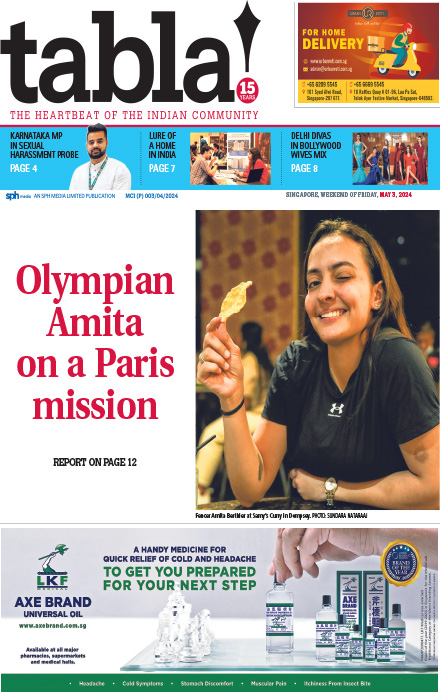Inside one of several meeting rooms in the offices of Tolaram Group, I’m drawn to a glass cabinet that displays an assortment of Indomie and Kellogg’s products.
A fan of Indomie instant noodles, like many Singaporeans, I notice a few “exotic” flavours I never knew existed.
“Those are only available in Africa,” says a soft-spoken man as he enters the room.
In my research of the Tolaram Group and its managing director of Africa operations Haresh Aswani, the term “gentleman” had often arisen.
The 63-year-old Singaporean, regarded by-and-large as a dignitary in Nigeria for his business dealings in the country over the past three decades, had a mild-mannered and disarming quality about him, which perhaps makes sense when you consider how he has influenced and impacted so much in the African nation.
Tolaram Group is perhaps best known as the company that introduced Africans to instant noodles.
Having started out trading textiles in 1948 in Indonesia, the Singapore-based group is now one of Africa’s largest conglomerates, with interests in consumer goods, infrastructure and fintech. Its businesses span over 15 countries and its products reach consumers in about 100 countries.
But it is in Nigeria, where it has built West Africa’s largest deep water port and free trade zone, that the company has its deepest foothold.
Located 60km east of Nigeria’s commercial capital Lagos, on an 850ha site, the Lagos Free Zone is the country’s first privately owned special economic zone, with a fully integrated deep-sea port, and has attracted cumulative investments of over $2.5 billion to date.
Designed by Singapore’s Surbana Jurong and built in partnership with China Harbour Engineering Company, the industrial park when fully occupied will host more than 100 businesses engaged in various sectors of manufacturing, commercial real estate, and logistics and supply chain management. The facility generates its own power and has ready-to-lease factories, residential complexes, medical facilities, transport depots and warehousing facilities.
More than a dozen companies have moved in, including BASF, Tata International, Kelloggs, Arla, Dufil Prima Foods and Colgate-Palmolive.
The Lekki port, with a draft depth of 16.5m, is the deepest sea port in Nigeria today and designed to handle ships carrying up to 18,000 standard shipping containers. Since its opening last year, the port has employed around 20,000 people.
“The free zone and ports are a game changer,” says Mr Haresh, who adds that the port’s aggregate impact on the Nigerian economy over a 45-year concession period will be around US$360 billion ($485 billion).
“Africa has huge potential for double-digit growth, and Nigeria is the largest country in the continent both by GDP and by population (218.5 million). There are a lot of companies that want to tap into the market but can’t because of a lack of infrastructure. The port and the free zone change all that, to the point that the country becomes a manufacturing hub; because it has all the ingredients – land, agriculture, gas, energy sources, a young workforce.
“The port is going to be as efficient as ports in Dubai, Shanghai or Singapore. But we will take some time to ramp up our efficiency to get there.”
Tolaram already had a presence in Africa in the mid 1980s when Mr Haresh joined the company. Under his watch, the firm introduced instant noodles to African consumers, an undertaking that involved “changing the dietary habits of Africans”, so to speak.
It wasn’t easy at first. The Indomie venture made a loss between 1996 and 2001. But thanks to savvy consumer education – “people in Africa were used to eating with their hands and didn’t know how to eat noodles,” explains Mr Haresh – by 2002, the product had become a hit with Nigerians. Soon, it caught on with other countries in the region, including Ghana, Kenya and Egypt.
The company then inked several big joint ventures, including with American cereal giant Kellogg’s, Danish dairy producer Arla and consumer-product giants Colgate-Palmolive and Kimberly-Clark.
Born in Indonesia and raised in Malaysia, Mr Aswani has been a Singapore citizen since 2004, and has served as the Republic’s honorary consul-general to Nigeria since 2006.
After accomplishing so much for and in Nigeria, I ask if he has the country’s leaders on speed dial.
“They keep changing their numbers,” he replies in jest. “But I’m sure they have my number on (theirs).”
But why Nigeria, a land with an unfortunate reputation for corruption, and included among the countries with the least peace in the world, according to the Global Peace Index?
“It’s about believing in the country,” Mr Haresh explains. “There’s so much to learn in that part of the world, it’s a pity that many Singapore companies don’t see it.
“The problem is perception, they fear Africa. They see the headlines, they panic. But we do in excess of $1.2 billion and $1.3 billion in business per annum. That’s the scope.
“We actually went through a cycle; We were doing well at first and then we had an issue when the country stopped all payments and began issuing promissory notes. That made a lot of companies go bust, foreign ones especially. But we survived that.
“You must look at Africa as a long-term game. That’s how we look at Nigeria. And if you can survive in Nigeria, you can do business anywhere in Africa.”


“The problem is perception, they fear Africa. They see the headlines, they panic. But we do in excess of $1.2 billion and $1.3 billion in business per annum.”



